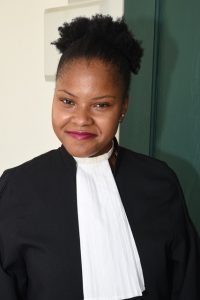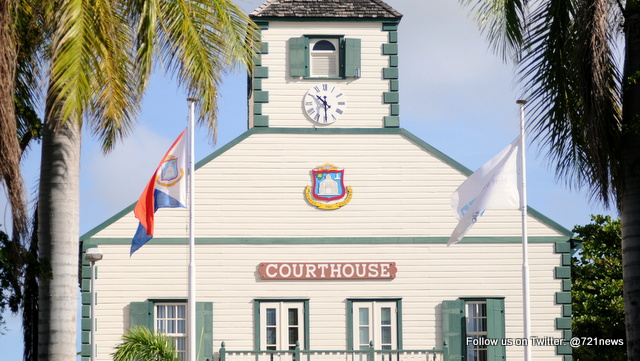Source Today Newspaper

GREAT BAY – The lawsuit the Pointe Blanche Inmates Association brought against the country yesterday has more the character of a mediation session than that of a legal dispute that called the government to task. Parties will meet again on March 17 and on that day, the court has asked the country’s representative, attorney Aernout Kraaijeveld to present an overview of measures the justice ministry is able to take to improve the situation at the prison.
That agreement came about after quite some toing and froing between Judge Katja Mans and the attorney who kept insisting that the ministry is already in the process of taking measures. The court wants to see a more detailed overview, complete with achievable dates of completion.
The board of the Pointe Blanche Inmates Association was present at the hearing with its President Antonio Joseph, Vice-President Edison Fleming, Secretary Nikerson Boireau and Treasurer Nestor Sanchez.
At the end of the more than two-hour hearing, the judge asked the board members about their priorities. “We want our safety. That is our main concern,” Sanchez told the court, adding that the overpopulation of the prison causes stress and demotivation. “We want the prison population to go down,” he said. The other board members expressed similar sentiments.
That safety is high on the agenda for the inmates is no surprise. Attorney Sjamira Roseburg mentioned in her opening statement the fatal shooting of Omar Jones on August 31, 2016, an attack with an improvised weapon on the association’s President Antonio Joseph in October of last year, several attacks on inmate Brendan Dixon, most recently on December 29, the discovery of a loaded firearm on January 31 and the stabbing of Ramon Gumbs on his birthday, February 14. A week later Omari Mussington was stabbed, and last Friday there was yet another stabbing incident.
Ramon Gumbs is for medical treatment in the Dominican Republic, where, according to Roseburg, he is fighting for his life. “I hear that he has been declared brain dead. If that is true, it will be the second fatality within the prison within a couple of months,” she said.
“The sentiments of unrest and feelings of unsafety about work, living and lodging circumstances have increased significantly,” Roseburg pointed out. “In spite of this, up to this day the security measures within the prison have not been upgraded. The question is what else needs to happen before the prison implements stricter security measures.”
The inmates association detailed fifteen demands in its petition to the court. They vary from drastically improved security measures, the suspension of director Rohan and claims for damages causes by prison searches to a protocol for searches, a maximum of two prisoners per cell, new books, washing machines an telephones, programs for rehabilitation and re-socialization and a discount on all prison sentences of 10 percent.
Attorney Kraaijeveld asked the court to declare the plaintiffs inadmissible, based on the association’s articles of incorporation that stipulate that it is inadmissible if it has insufficiently attempted to achieve its goals through consultation. “The association has done nothing to achieve its goals through consultation,” he said.
Kraaijeveld dismissed all fifteen demands from the Inmates Association either because the plaintiff has no interest in the issue, or because the country has already complied with a demand.
This is for instance, in the view of the country, true for the demand for stricter security measures. “They were recently made stricter. The association has no interest in a conviction for something that is already being done.”
Kraaijeveld labeled the demand to suspend prison director Edward Rohan (who is currently on a three-month leave of absence at the insistence of Justice Minister Rafael Boasman) “completely unprecedented. “This is literally about inmates, convicted criminals, who attempt to get rid of the director of their prison. The position that an association of inmates no longer has confidence in a prison director cannot lead to the conclusion that the director has to be suspended for that reason. The House of Detention is not a democracy.”
Kraaijeveld’s opponent, attorney Sjamira Roseburg pointed to the report the Law Enforcement Council published last Friday about the situation at the prison to underscore her points.
“One of the concerns of the council is what to do in case of calamities,” she said. “In case of a fire the consequences will be unimaginable. There is only one escape route, locks are not working optimally and they cannot be opened in conformation with the regulations. In case of fire this will become a nightmare.”
The Law Enforcement Council says in its almost 60-page report that its findings and conclusions after its most recent inspections “form a serious threat to the legal order.”
The problems the prison is facing are more than the organization is able to handle on its own, the council writes in its report. “Even basal matters that are indispensable for the closed setting of a prison are lacking: from a functional wall around the prison, properly functioning locks and functioning security equipment to matters the organization needs to create a healthy living and working climate.”
How dire the situation at the prison is appears from some data Roseburg presented. There are currently 119 inmates – 115 men and four women. For each shift there are four guards available: one for the women’s wing and three for the male prison population. That amounts to one prison guard in the male section for every 38 inmates. The guards are doing 12-hour shifts and they are overworked, undertrained and under qualified.
Roseburg objected to a proposal by the justice ministry to give it three months to normalize the situation in the prison, without paying heed to the demands of the inmates association. “Is the minister then able to guarantee that after today, awaiting the three months normalization process, there will be no more incidents in the prison? I don’t think so.”
Roseburg said that the safety of prison guards, visitors and professionals (like attorneys) are at risk. But the 119 inmates are also at risk every day, she added. “I say: enough is enough. We need a solution in the short term.”
Roseburg suggested asking the Netherlands for help, but Kraaijeveld indicated that this request has already been made – and honored. Members of the local detachment of the Royal Dutch Navy are providing assistance at the prison.
Roseburg established that during reach shift there is one guard for the women’s wing, and at best three guards for the male prison population; during the weekends this could go down to two guards, she said. “This is irresponsible; it endangers everybody’s safety and the consequences could be drastic.”
The attorney requested the court to make sure that there are at least seven guards on duty during each shift. “If this can only be realized by putting guards to work that are currently on paid leave, then that will have to be done.”
Roseburg furthermore told the court that currently guards are not getting any training and that there is no structure for rehabilitation. Such a structure should include training and – based on an inmate’s progression – followed by weekend leave and electronic supervision. For foreign inmates, Roseburg suggested a sentence discount of 10 percent.
“Such a rehab concept creates peace within the prison, because actions during the rehab program have consequences. “Currently this is not the case and inmates are thinking: I am already serving a big sentence so who cares.”
The country’s attorney asked the court to declare the Inmates Association inadmissible in its demands, but Judge Katja Mans was not ready to go straight to that point.
“The state of civilization of a country hinges on the way it deal with its prisoners,” she noted. She referred to the constitution, in particular article 30 that states the following:
- All persons who are deprived of their liberty shall be treated humanely and with
respect for the dignity inherent to human beings.
- Suspects shall be held separately from convicted individuals, unless in
exceptional circumstances, and are entitled to claim distinctive treatment in
accordance with their status as unconvicted individuals.
- Suspected youths shall be held separately from adults and brought before the
courts as rapidly as possible.
- The prison system shall provide for treatment of inmates focusing primarily on
re-education and re-habilitation. Imprisoned youths shall be held separately from
adults and shall be treated in accordance with their age and legal status.
Judge Mans also quoted the report from the Law Enforcement Council that says that the prison has not made any progress on crucial issues. She also reacted to the inmates demands of a maximum of two inmates per cell. Currently, the prison places three inmates in a cell.
The cells measure ten square meters and one recommendation from the CPT, the European Committee for the Prevention of Torture is that inmates should have at least 4 square meters at their disposal. This makes cells of 10 square meters unfit for housing three inmates. In Pointe Blanche, prisoners are locked in their cells 22 hours a day.
Judge Mans pointed out that, as a judge in summary proceedings, she is not able – or willing – to manage the Pointe Blanche Prison; hence her attempt at mediation. The case will continue on March 17.





























